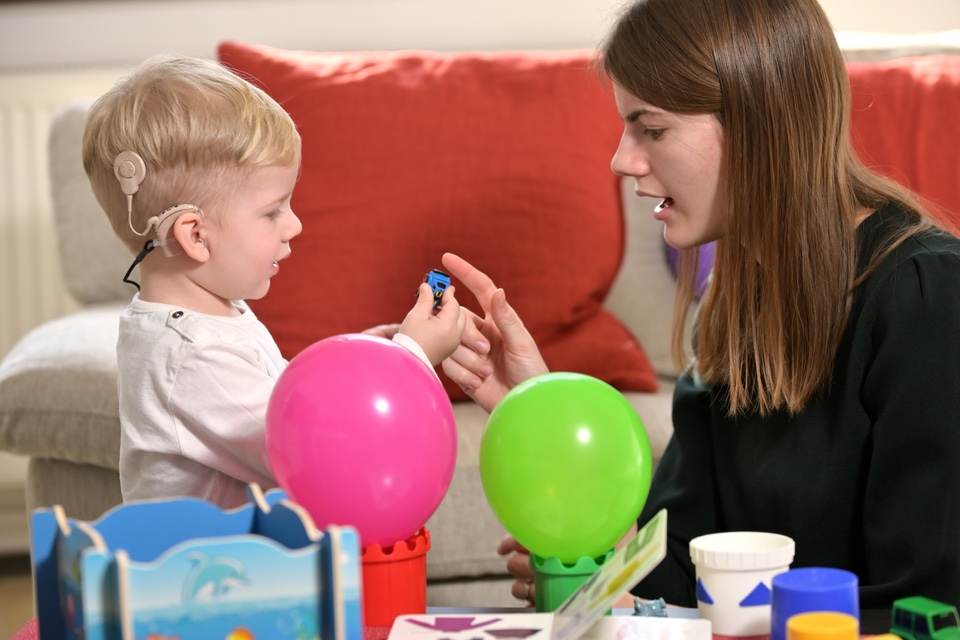Research finds new evidence of visual learning differences between deaf and hearing children

Researchers at Keele University have found new evidence of how deaf infants and those with normal hearing process visual information differently during their early learning.
Infants and toddlers spend most of their waking hours actively exploring their environment, as they observe the world with fascination and experience the sights and sounds caused by their own actions, and these early sensory experiences help guide the normal development of social and cognitive skills. This means that children with hearing loss face unique communication and social challenges, and their performance across a range of general cognitive skills – including perception, attention and memory – is also affected.
The researchers are the first to study visual learning in similar aged infants and toddlers with and without hearing loss. They compared learning between deaf infants, toddlers who had no hearing but had received cochlear implants, and infants and toddlers with normal hearing.
Researchers tested how quickly infants and toddlers could learn a simple visual pattern, as learning patterns - what researchers call "statistical" learning - is a crucial learning mechanism in early infancy that allows babies to start to understand their environment and is a building block for language.
Using eye-tracking, they found no evidence of learning in the deaf infants, who have had no meaningful experience with sound in their lives so far. All other participants—hearing infants, toddlers with cochlear implants, and hearing toddlers—have experienced some degree of access to auditory signals and all demonstrated learning. Toddlers with stronger visual learning also showed more advanced language development.
Researchers say these findings might suggest that six to 12 months of auditory experience through a cochlear implant could be sufficient to reverse the remapping of the brain that results from hearing loss and affects how children use their vision to learn about the world.
The findings have been published in the journal Infancy and the researchers say they shed new light on the mixed body of evidence demonstrating differences in cognitive development among deaf children.
Unlike prior work, which has focused on broad age ranges of school-age children, the study included prelingual deaf infants—who have experienced no functional auditory input and limited language input—and deaf toddlers, who have between six and 12 months of hearing experience with their cochlear implants.
Dr Claire Monroy, lead researcher and a lecturer in psychology at Keele, says the findings provide additional evidence for links between visual statistical learning and language abilities, which may have implications for clinicians who provide speech therapy and other early intervention services for children with hearing loss.
She said: "These findings also highlight the fact that babies born with atypical sensory experiences perceive and learn about the world in unique and different ways. Our next goal is to understand what the root causes of these differences are."
Co-author Professor Derek Houston, from The Ohio State University, said: "These results are interesting because most people wouldn’t expect there to be a difference in a visual learning test that has nothing to do with hearing. Our findings highlight that the ear is connected to the brain - experiences with sound influence not only the brain processes related to hearing and language, but also general neural and cognitive development."
Most read
- Keele University announces new Vice-Chancellor
- Keele University’s cherry tree collection receives top accolade from Japan’s Ambassador to the UK
- Keele named global leader in planetary health across three subjects
- Researchers creating map of mosquito genes to help control disease
- Keele Law School’s Legal Advice Clinic and CLOCK now based at Keele in Town
Contact us
Andy Cain,
Media Relations Manager
+44 1782 733857
Abby Swift,
Senior Communications Officer
+44 1782 734925
Adam Blakeman,
Press Officer
+44 7775 033274
Ashleigh Williams,
Senior Internal Communications Officer
Strategic Communications and Brand news@keele.ac.uk.


